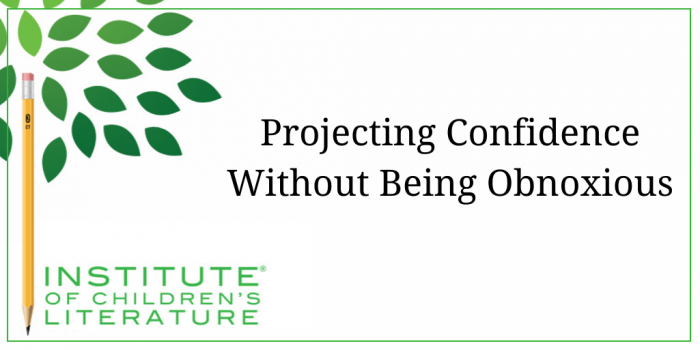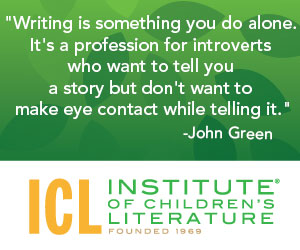1000 N. West Street #1200, Wilmington, DE 19801
© 2024 Direct Learning Systems, Inc. All rights reserved.

We teach our students how to write and get published!
View our Course Catalog >

Sound tough?
Yeah, but it’s not quite as hard as it sounds. There are a few things to keep in mind:
#1: Don’t Spill Your Insecurities on a First Date
In a query letter or cover letter, this means don’t tell the agent or editor that you’ve been trying to get published for the last ten years and you’re hoping this is your magic bullet. Don’t tell the agent or editor that five others have rejected this piece but you did another revision and you’re hoping for the best now. Don’t tell the agent or editor about any of your missteps, rejections, fears, worries, lack of support at home, nothing like that. If you’ve never been published, then don’t mention past publication history. Query letters and cover letters are short. You leave out a lot of things that could go in there. So leave out that. Use the extra room to better describe the thing you’re actually selling: your project.
But what about publishers that specifically ask for your past publication history? Well, first, they probably prefer not to look at material from unpublished writers. If you tell them you’re an unpublished writer, they may simply toss the submission aside without reading it. Thus, if you feel like you probably aren’t ready to compete in publishing arenas that favor experienced, published writers, then skip those publishers that clearly prefer them. But if you feel like this thing you’ve written can stand up against the competition, simply don’t mention your publication history (or lack thereof) and let the thing you’re trying to sell stand on its own merits. If you describe your project well enough and display strong skills in that portion of your letter, your publication history will not be that important.
#2: Be Friendly, but not Folksy
The tone you’re trying for in a cover letter or query letter is light, friendly, but professional. Professional doesn’t mean stiff. It doesn’t mean trying to write like you “imagine” writers speak. It doesn’t mean trying to sound like a business person or an academic. It means sounding like you––just normal, ordinary you. So if you’ve written a sentence that you couldn’t imagine putting in a letter to a friend, then it’s probably stiffer than you need. But at the same time, this isn’t a letter home from camp, so leave out chat about your kids, your grandkids, your spouse, assorted friends and family members who’ve read and liked your writing, etc.
Another thing to leave out (unless you’re desperate to add a little length to your letter) is mentions of things like SCBWI (the Society of Children’s Book Writers and Illustrator) conferences you’ve attended or Institute classes that you’ve taken (unless your attendance directly relates to why you chose this publisher or why you believe this publisher would be interested in this project.) So I might for instance say something like “during ICL’s recent online workshop, I was pleased to hear that Possum Publishing was looking for more realistic possum stories. I believe “Pumpkin Pickin’ Possum” is just such a story.” But I would not say, “I’ve attended five different SCBWI conferences, two Highlights workshops, and completed two courses with the Institute of Children’s Literature.” It’s good that you did all that, and it most certainly is helpful to you, but in your letter you should stick for focusing on your project.
This advice is slightly controversial, as I’ve heard folks say that listing all the study you’ve done shows you’re serious about your writing. And it’s good to show that you’re serious about your writing. But I truly believe it is best to do that by writing a query letter, cover letter, or proposal that reflects your skill in light, engaging writing. The person you’re writing to is interested in your skill, not so much in how you got that skill.
#3: Don’t Pretend or Over-hype
The flip side of not spilling your insecurities is not over-hyping. Editors and agents actually say things like, “Don’t tell me your story is great or amazing or the best I’ll ever read. Tell me about the story, and when I read it, I’ll decide if it’s great enough for us.” It’s easy to be unsure if the words we choose are over-hyping. After all, we read over and over that publishers are looking for humor, so shouldn’t you tell them the story is “laugh out loud funny” or “hysterical?” It is important to highlight those elements that make your story appealing, but this is a definite case of “show, don’t tell.” So you might describe the piece as a “humorous look at the honor of being in a wedding through the eyes of one ten-year-old boy.” It’s okay to say it’s “humorous” as that’s more a descriptor of style than a value judgement. But if you say the piece is a humorous story, then you need describe the story in a way that lets that humor shine through. Make your description funny, and the editor will believe the project is funny.
The same goes for things like “edge of your seat tension” and “heart-pounding terror.” Many times the urge to over-hype comes from the erroneous belief that the description of the project we put in a query letter or cover letter or proposal should sound like a movie blurb or a book blurb. Those things can be fairly full of hype. But your presentation of the project cannot. If you want to show the story is exciting, make it sound exciting through the description itself, not through subjective hype words. If you want to show the story is funny, make it sound funny as you describe it. It’s fine to typify it with genre labels like “humor” or “adventure” or “thriller” or “mystery,” (as long as the story actually meets the rules for the genre) but then use the way you describe the piece to convince us that it’s laugh-out-loud, or nail-biting, or terrifying, or gripping.
So how do you go about describing the project in a way that brings those things across? Do it with your tone, your pacing, your style, and your word choice. For instance, here’s a possible description of a story: “Ten-year-old Arnie Yoss didn’t mind being in his sister’s wedding. Not exactly. But did they really need to use him as a dressmaker’s dummy for the flower girl’s frilly pink princess gown? And why is everyone constantly crying or yelling or grabbing his hand with sticky fingers? Arnie decides there’s only one way to get the misery to end. He launches “Project Elope” to convince his high-strung sister and her bug-eyed boyfriend that there’s nothing more romantic than getting out of town and leaving the wedding as a distant memory of the horror that almost was.” Now, notice that this description doesn’t say the story is funny. It does use a little hyperbole but only to show Arnie’s tone, not to hype the story itself. In the opening of the letter, I would describe the story as a humorous contemporary middle grade novel, but then my description needs to show that the story is going to be funny. So make your rule to “tell without hype and back it up with showing through specific examples.”
Keep in mind that any genre word you use for the story needs to be reflected in the description. If I call my story a “mystery” then the description of the plot better reveal that it’s a mystery. If I call the story an “adventure” then it better not just be a fairly mundane drive to Grandma’s house. It better be a ride that is catastrophically different from every other ride ever, because you’re calling it an “adventure.” So even in your choice of genre word like “mystery” or “adventure” or “fantasy,” you have to be sure your description clearly shows how the story fits that genre. Looking back at Arnie’s experience, the story is going to be the tale of a kid roped into being in a wedding and the trappings of the wedding sound pretty normal, so the editor is going to believe it’s “contemporary.” If I made it “historical” then I’d need to add more information to the description to set it at a spot in history. And I’ve tried to recap some of the funny events in the story so the editor can see it will be humorous. So think carefully about how your story conforms to genre and then describe it in an interesting, engaging way that demonstrates how it conforms to the genre you said it fit.
Consolidating your story down to a few lines can be a challenge. It is something that will quickly reveal plot weaknesses if you find that you just flatly cannot describe the story in a few sentences. But it is also a kind of puzzle that is worth the challenge as offering an editor a tasty new story is the first step in making the sale you’re hoping for. Good luck with it.
With over 100 books in publication, Jan Fields writes both chapter books for children and mystery novels for adults. She’s also known for a variety of experiences teaching writing, from one session SCBWI events to lengthier Highlights Foundation workshops to these blog posts for the Institute of Children’s Literature. As a former ICL instructor, Jan enjoys equipping writers for success in whatever way she can.
1000 N. West Street #1200, Wilmington, DE 19801
© 2024 Direct Learning Systems, Inc. All rights reserved.
1000 N. West Street #1200, Wilmington, DE 19801
© 2024 Direct Learning Systems, Inc. All rights reserved.
1000 N. West Street #1200, Wilmington, DE 19801
© 2024 Direct Learning Systems, Inc. All rights reserved.
1000 N. West Street #1200, Wilmington, DE 19801
© 2024 Direct Learning Systems, Inc. All rights reserved.

1000 N. West Street #1200, Wilmington, DE 19801
© 2025 Direct Learning Systems, Inc. All rights reserved.

1000 N. West Street #1200, Wilmington, DE 19801
©2025 Direct Learning Systems, Inc. All rights reserved. Privacy Policy.